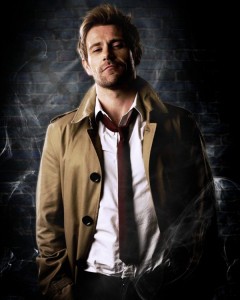
Last Friday, NBC debuted Constantine, an American television series based on the characters appearing in the comic series Hellblazer published by DC Comics under their Vertigo imprint. The series will focus on John Constantine, a dark exorcist, occult detective and con man who is struggling with his past sins as he tries to protect humanity from a gathering supernatural threat. What the series won’t focus on, at least not for now, is Constantine’s bisexuality, a fact that Holly Eagleson, in her persuasive argument online, successfully extrapolates as part of a larger problem with television and film and the way in which they deal, or, more often than not, don’t deal with sexuality in general and bisexuality specifically.
Constantine is generally accepted to be one of few bisexual characters in the comic book canon, though the references to his sexuality are subtle. But at the Television Critics Association’s press tour this summer, Constantine’s executive producer Daniel Cerone minimized the importance of his orientation, citing no concrete plans to address it on the series. To be fair, Constantine’s bisexuality isn’t explicitly referenced in the source material at its start. And the show’s producer, David S. Goyer, hasn’t ruled out addressing it. “We never said he wasn’t [bisexual]. It’s just not what we’re leading with,” Goyer told reporters this summer. He added, “When [Constantine] was first introduced, sexuality was not the big thing they were featuring. They didn’t even get into that, regardless of who he slept with, for a year or two.”
The history of bisexuality in television and film has been one mainly of controversy. Gay rights groups howled in protest when, in Steven Spielberg’s film adaptation of Alice Walker’s The Color Purple , Celie Johnson’s bisexuality was straight-washed, a term Eagleson routinely returns to.
In Ang Lee’s superb Brokeback Mountain, the two male characters, Ennis Del Mar and Jack Twist, are assumed to be gay but, given the milieu, are forced to live – and struggle with – the complex relationships with their female partners.
Even the hugely successful Skyfall dabbles in bisexuality where, naturally, Raoul Silva is the villain.
But Eagleson is right to point out that when bisexuality appears, it is almost inevitably between two women. “Of course, when you do see a bi character, nine times out of 10 she’s female. Women’s sexuality has long been viewed as titillating to heterosexual viewers; in a few instances, bi female characters have even had decent storylines. (See Orange Is the New Black, Glee, Grey’s Anatomy and House.) Scripted shows with male bisexual characters, however, struggle to gain footing or even a pilot. Sean Hayes was reportedly working on a TV project in 2008 called Bi-Coastal about a man married to a woman in California while also having a boyfriend in New York. It appears to have gone nowhere.”
According to Denise Penn, a clinical social worker on the boards of the American Institute of Bisexuality and Lambda Literary, says it can be traced to a fear of bi men that’s a holdover from the early days of the AIDS epidemic. “It was so easy to scapegoat bisexual men, that they’re the ones on the down low, bringing the virus back to their wives and girlfriends,” Penn says. “Even today there’s a stereotype that bisexual men can’t possibly be monogamous and that they’re opportunistic.” Promiscuous and calculating certainly apply to Francis Underwood, the Machiavellian lead character on Netflix’s House of Cards, one of few male bisexuals in current series.
She adds, “Greater representation creates a feeling of acceptance and encourages people to come out, and people need to do that to be whole,” Penn adds, “It’s also a chance to demystify bisexuality for mainstream population, much in the same way that the work of transgender advocates such as Laverne Cox and Janet Mock and series like Orange Is the New Black and Transparent have done.”
With the continuing fragmentation of the American viewing audience and threat posed by cable series that offer increasingly high-quality adult fare, the fate of bisexuals in film and television remains to be seen. But Kyle Schickner, a filmmaker who is bisexual, remains skeptical. “I’m the first to recognize how much of a risk there is when producing films and TV is so costly.” Through his production company, FenceSitter Films, he created the Web series Rose By Any Other Name, which is about a lesbian who falls in love with a man. “I would love to see a character in a show that’s out and in a monogamous relationship with a boy or girl. But because we’re so underrepresented, any representation ends up being a good one. It’s the invisibility that hurts the most.”












Are human beings born bisexual? I discuss it here: http://www.amiehu.com/2012/12/are-all-human-beings-born-bisexual.html